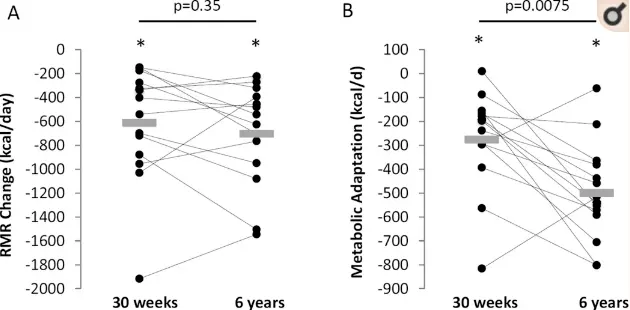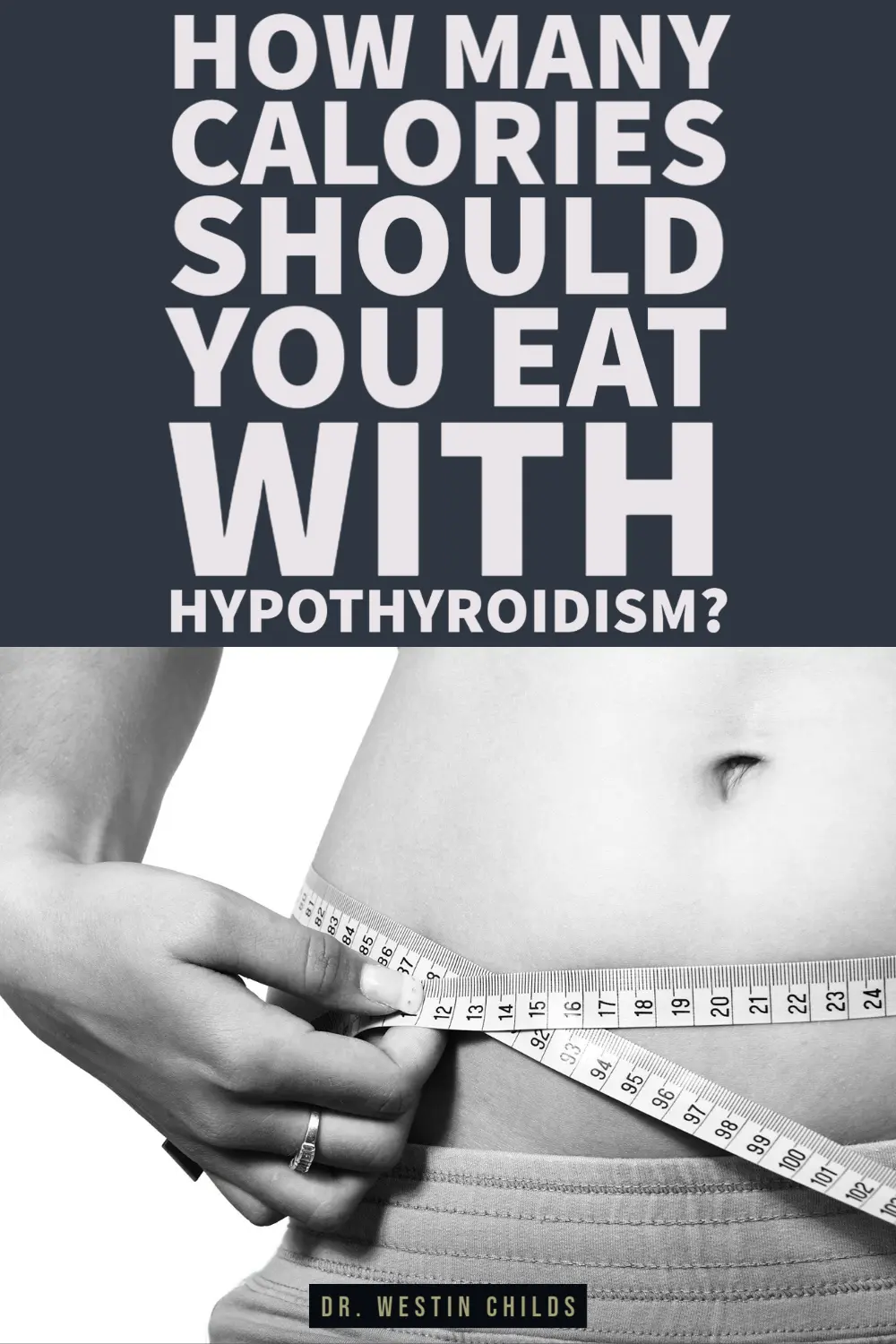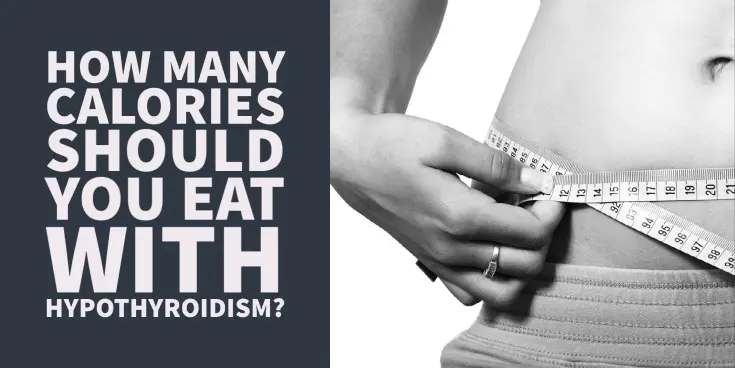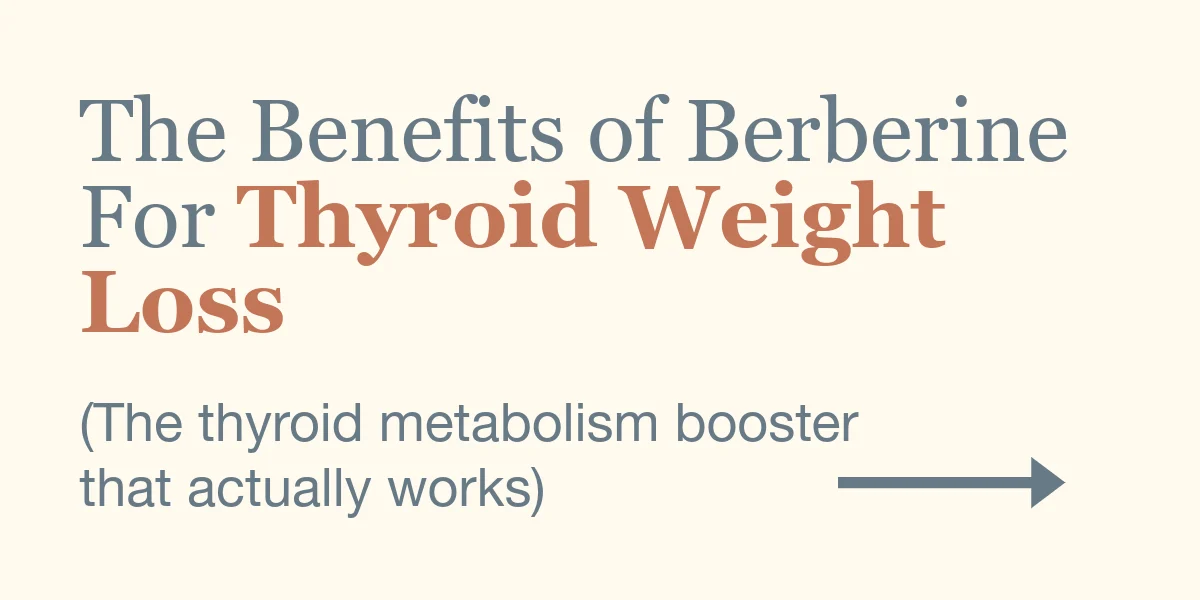You’ve heard it before:
If you want to lose weight then you need to count your calories.
I hate to break it to you but counting calories may be one of the worst things you can do if you have a thyroid problem.
Calories do play a role in weight maintenance but they aren’t nearly as important as you might think if you have a thyroid problem.
Here’s why:
Patients who have thyroid problems have a problem with their metabolism.
And if you don’t address the metabolism issue then you won’t lose weight.
End of story.
There’s obviously much more to this idea which is why we need to discuss how calories impact your weight if you have a thyroid problem, how they impact your thyroid, and how you can actually lose weight and keep it off.
Today you will learn:
- How calorie restriction (or counting calories) can negatively harm your thyroid and ultimately lead to weight gain, even if it helps you lose weight temporarily.
- Why weight gain in hypothyroid patients is primarily driven by your hormones and not by calories.
- Why you should match your calorie consumption to your metabolic rate and how appetite helps you determine this.
- More about certain conditions that confuse your appetite and why these must be addressed if you want long-lasting weight loss.
DOWNLOAD FREE RESOURCES
Foods to Avoid if you Have Thyroid Problems:
I’ve found that these 10 foods cause the most problems for thyroid patients. Learn which foods you should avoid if you have thyroid disease of any type.
The Complete List of Thyroid Lab tests:
The list includes optimal ranges, normal ranges, and the complete list of tests you need to diagnose and manage thyroid disease correctly!
How Calories Impact Your Thyroid
One question that I get asked frequently on this blog and in the comments section has to do with how many calories should be consumed if you have hypothyroidism.
The question goes something like this:
“I’ve been told by my doctor to eat only X amount of calories per day to lose weight. Is this enough if I have hypothyroidism?”.
You can substitute out the X for just about any amount of calories under your daily recommended needs which is usually around 2,000 or so and the answer is the same:
You never want to reduce your calories as a means to lose weight if you have hypothyroidism.
Why?
Because calorie reduction, especially in hypothyroid patients, will result in the combination of ‘metabolic adaptation’ and ‘thyroid damage’.
The term ‘metabolic adaptation’ is the actual scientific name for what occurs during calorie restriction (1).
Under persistent calorie restriction, your body responds in a number of ways:
#1. It reduces your Free T3 dramatically (18 weeks is enough to drop your free T3 by as much as 66% (2)).
This is obviously incredibly important because T3 is the most active form of thyroid hormone in your body and free T3 is directly correlated with your ability to lose weight and keep it off.
You can think about your T3 level as the true measure of how well your thyroid is functioning and how strong your metabolism is.
As T3 levels drop you will see an increase in weight gain and a drop in how many calories you burn each and every day.
#2. It increases your reverse T3 by as much as 27% – 50% (3).
Reverse T3 is an anti-thyroid metabolite that your body creates when it is under stress and when it can’t convert T4 into T3.
It’s a sign that your body is not utilizing thyroid hormone correctly.
High levels of reverse T3 may lead to thyroid resistance and impair what little amount of free T3 you have left floating around.
Other states that result in high reverse T3 levels include chronic illness and severe acute illness (neither of which are ideal!).
#3. Your free T4 levels may stay the same or increase (4), most likely owing to a reduction in T4 to T3 conversion.
This isn’t a problem in itself but is an indication that something is changing in how your body processes thyroid hormones.
#4. Your overall metabolism will drop from metabolic adaptation.
It’s pretty simple, really.
Low thyroid function results in decreased metabolism which is not something you want if you are trying to lose weight.
#5. Your TSH may stay the same or actually get lower (5).
This may sound good at first, but the fact that your TSH does increase is probably due to the fact that your hypothalamus is being suppressed and can no longer produce TRH.
TRH is supposed to stimulate TSH so low levels of TRH will result in low levels of TSH.
Normally, we think of a low TSH as a marker that your thyroid is producing too much thyroid hormone but in this case, the exact opposite may be true.
This is also probably why most doctors fail to recognize the impact that calorie restriction has on the thyroid because they are so focused on the TSH (often to the detriment of the patient!).
With this as a solid framework, let’s dive into some more information about calorie restriction, weight gain, and how it all fits together.
What Counts as Calorie Restriction?
If you are following the advice of your doctor and reducing your calories to try and lose weight maybe you have already experienced many of the consequences that I’ve listed above.
If not, maybe you are wondering if there is a way to only slightly reduce your calories to the point that you lose weight without negatively impacting your thyroid.
In other words, is there some point at which calorie restriction becomes problematic and some point at which it is beneficial?
Not exactly.
Any degree of calorie restriction, if prolonged, has the potential to cause issues.
Remember:
Your thyroid controls (at least in large part) how many calories you burn on a day-to-day basis.
This is often referred to as your metabolic rate which is often encompassed in the term metabolism.
In reality, there are many other factors that coalesce to form your metabolism but it’s easy to think of it in this way.
While the thyroid controls your metabolism, it’s important to realize that pretty much every single person with thyroid disease suffers from thyroid issues to varying degrees.
In other words, no two thyroid patients are exactly alike (shocker!).
If we took 100 thyroid patients and measured their metabolic rate (how many calories they are burning on a daily basis) what do you think we would find?
We would find that each person is burning a different amount of calories each day.
If we took that same 100 people and measured all of their thyroid lab tests (TSH, free T3, free T4, and reverse T3) what do you think we would find?
Do you think that we would find that every single person is burning the same amount of calories each day?
Absolutely not.
Do you think that we would find that each person has identical lab tests?
Again, absolutely not.
We would find a great deal of variance among those individuals and we would find that the needs of EACH of these patients are different!

The number of calories they consume each day would closely mirror the number of calories they burn each day (which is based on their metabolism) and this would be correlated with their thyroid function which is dependent upon how much thyroid medication they are taking (or how well their thyroid is functioning in general).
How on earth does it make sense to give the same recommendations (thyroid medication or otherwise) to all 100 patients if they are all so different?
It doesn’t at all and that’s the problem.
Each person deserves their own individual recommendations and advice.
Even though it’s obviously ideal to provide personalized advice, it’s also not practical in this blog post as hundreds if not thousands of people will be reading this.
Instead, I’ll give you some basic information that you can work with to help you determine what your body needs.
Let’s start with the basics:
In general, you want to avoid ANY diet that seeks to ‘work’ by requiring calorie restriction in any way, shape, or form.
But please note that when I use the term calorie restriction I am really talking about sustained daily calorie restriction over a period of 3+ weeks or longer (or 21 days straight).
This is an important distinction because some forms of calorie restriction can actually be beneficial.
Prolonged and intermittent fasting fit into this category.
What is fasting if not a dedicated form of calorie restriction? That’s exactly what it is but there seems to be some benefit to this method of calorie restriction compared to constant and prolonged daily calorie restriction.
Intermittent and prolonged fasting protocols seem to have a beneficial impact on metabolism, thyroid function, and inflammation and typically do not cause damage to the thyroid (unless they are done in excess).
With this information in mind, the following diets should be considered off-limits:
- Diets that impose restrictions on the number of calories you can consume at each meal.
- Diets that impose restrictions on the number of calories you can consume throughout the day.
- Diets that impose restrictions on your portions at each meal.
- Diets that entail extreme workouts as a means to burn more calories than you consume.
- Diets that promote a specific amount of calories that should be consumed based on generic information such as your gender, height, weight, etc.
If this information isn’t enough, then you can also see a list of diets that would fit into these examples below:
- The hCG diet
- Weight Watchers
- Virtually any other diet that recommends limiting your food intake or counting your calories
Not included on this list would be diets that cause a natural reduction in calorie consumption through their impact on hormone balance or appetite hormones.
This could be diets such as the ketogenic diet or carnivore diet which may cause natural calorie restriction due to changes in ketones or other biomarkers which influence metabolism.
These would be considered natural forms of calorie restriction by taking advantage of pathways in the body sometimes referred to as biohacking.
While I’m not a huge fan of the ketogenic diet for thyroid patients, which you can read more about here, it would technically be ‘approved’ and can potentially be helpful for some thyroid patients.
The same is true of the carnivore diet.
Why Thyroid Patients Really Gain Weight
To further push the point home that calories do not always correlate with weight gain (or weight loss), let’s look at some of the reasons why thyroid patients gain weight.
It may appear simple, but it’s actually a little more complex than you might think.
It all starts as thyroid function declines or as you become hypothyroid.
This starts a chain reaction of events and each thing makes losing weight a little more difficult.
As your thyroid function declines you will first see a drop in your metabolism.
This makes sense because your thyroid is one of the primary regulators of your metabolism and, as every thyroid patient knows, weight gain is one of the first symptoms of low thyroid.
With this information, we are faced with a problem:
If that’s true that hypothyroid patients gain weight when their thyroid is low, which it definitely is, why then do they not lose that weight once they start taking thyroid medication?
If that thyroid medication is ‘normalizing’ their thyroid function, wouldn’t we expect that extra weight to come off if it’s related to their thyroid?
We would, and why it doesn’t is a complex and confusing topic and something I refer to as the thyroid weight gain paradox or thyroid obesity myth.
Important to this discussion, but something we won’t spend time on, is the fact that most thyroid patients are undertreated due to the current thyroid treatment paradigm (but this still applies to thyroid patients who are adequately treated with thyroid medication as well).
Back to the thyroid and weight gain for a minute.
As I mentioned above, a drop in thyroid function causes a chain reaction of problems, and these other problems also lead to weight gain.
What this means is that there are other factors that cause weight gain in thyroid patients and these factors are independent of their thyroid.
In other words, your thyroid problem causes other problems that need to be addressed if you want to lose weight.
The biggest and most pressing problem is the influence that low thyroid function has on other hormones in your body.
Thyroid dysfunction causes a cascade of hormone imbalances that are not ‘fixed’ with the proper replacement of thyroid medication which results in persistent weight loss resistance even in the face of treatment.
You’ll know if you fit into this category because you will be told that your thyroid looks ‘fine’ but you still won’t be able to lose weight.
You can see documented examples of how your hormones obviously impact your weight here:
- Studies show that patients who undergo thyroidectomy gain up to 20 pounds on average and typically can never lose it (6). This occurs even in the face of taking thyroid medication faithfully.
- Studies show that women who undergo menopause gain on average 15 pounds (7). Menopause marks the decline of estrogen and progesterone.
- Women who have their gallbladders removed gain weight (8). Gallbladder removal does not impact appetite yet still has an impact on weight.
- Women who have their uterus removed gain weight (9). Women without a uterus experience resistance to progesterone.
- Women who start insulin for diabetes immediately gain weight (10). Insulin, of course, is one of your fat-storing hormones.
Do you think it makes sense that the women in these studies suddenly changed the number of calories that they consume right after their surgeries or procedures?
Or do you think it’s more plausible that these surgeries impacted their hormones which then impacted their weight?
Women who fall into any of these categories will never have success with calorie-restricted diets (the answer from most doctors) because it doesn’t address the primary cause of their weight gain.
The weight experience in each example above was caused by hormone imbalances, not by calories.
In fact, if you fall into any of these categories and you were to try to restrict your calories you would drag down your thyroid in the process and only make the problem worse.
If that’s the case, what is the answer?
Ensure that you address the main problem (your hormones) and not the number of calories that you consume.
You can read more about how each of these systems contributes to weight gain and how to treat them below:
- Weight gain induced by cortisol
- Weight gain induced by insulin resistance
- Weight gain induced by leptin resistance
- Weight gain induced by low testosterone
- Weight gain induced by menopause (and other sex hormone imbalances)
- Weight gain induced by low thyroid function
How Many Calories Should You Eat?
The next logical question you should be asking yourself is how many calories should I consume?
And the answer is actually relatively easy to answer.
Simply put:
You should be consuming the same amount of calories that your body burns on a daily basis.
The good news is that your body has a built-in mechanism to help you do just that.
It’s called your appetite.
Your brain will tell you when it’s time to eat (unless you have certain conditions listed below) by inducing hunger!
As long as this system is working correctly, you will only be hungry when your body needs fuel and energy.
And your hunger will subside once you consume enough food!
It’s quite a simple system.
If you are consuming fewer calories than your body needs then your body will send signals to increase your hunger.
But what happens if you ignore those signals?
That’s when the problems arise.
If you do not respond to the hunger, for an extended period of time, then your body may start to alter the number of calories that it consumes by reducing your metabolism.
If you persist with your calorie restriction this lowering of your metabolism will continue as well and eventually, you will be in a state where you are burning far fewer calories than you used to each day.
If you don’t believe me, you can take a look at perhaps the easiest-to-understand study on this very topic.
Contestants of the Biggest Loser (a television series, if you aren’t familiar with it) were studied both before and after their weight loss journey by evaluating their metabolism.
Researchers found that after their weight loss and dieting efforts, on average, each contestant was burning up 400-600 calories LESS than they were before they started.

And the worst news is that this damage persisted for about 6 years afterward (11).
Let’s put this into context so you get a better idea of how this can impact you.
Imagine a hypothetical situation in which you are burning 2,000 calories per day.
In this hypothetical situation, you also have hypothyroidism, however, and it’s not being treated correctly (which is very common, by the way!).
As a result, instead of those 2,000 calories per day, you are burning somewhere closer to 1,800 calories per day.
Because of this, you are gaining weight and you want to do something about that.
So you decide to cut your calories down to 1,400 calories per day and you do this for 30 days.
Initially, you start to lose weight (maybe 5-10 pounds) and you feel great.
You keep this weight off even though you increase your calories back up to 1,800 to 2,000 per day.
Eventually, though, as it happens in about 99% of cases, you regain your weight back after about 6 months.
You want to fight this weight gain so you think to yourself that you’re going to get aggressive and lose this weight fast by doing what you did previously, only this time you are going to eat 1,200 calories per day.
What happens this time?
Instead of losing the weight like you think you will or should, you only lose about 2-5 pounds and it takes 60 days instead of 30.
But this time once you increase your calories you regain all of the weight you lost plus some extra and it occurs much faster.
Now you are an extra 5 pounds heavier over this 6-9 month period and confused.
So what happened?
The answer is simple, your body ‘adapted’ to the caloric restriction by reducing your metabolism which resulted in your weight gain.
You would have been better off testing for and addressing the hormone imbalances that were actually causing your weight gain, to begin with, such as your undertreated thyroid.
This vicious cycle is why there are so many women (and some men) in the thyroid community who simply can’t lose weight no matter what they do or try.
These same people are often left frustrated and confused feeling like nothing works for them.
Conditions Which ‘Confuse’ Your Appetite
Unfortunately, it’s only possible to rely on your appetite if you can trust that your appetite accurately reflects how many calories your body needs.
Under normal conditions, it does.
But under other conditions, your appetite may actually fool you.
It’s possible for your appetite to be greater than it should be due to a variety of factors.
This can make matching your calorie consumption to your appetite quite difficult (but not impossible)!
The following conditions are known to cause conflict with your appetite which may result in you eating more than you should:
- Leptin resistance (12)
- Eating disorders (predominately binge eating disorders)
- Certain prescription medications (13)
- Cortisol abnormalities (14)
- Depression (15)
- Certain gastrointestinal disorders (16)
- Pituitary/Hypothalamic disorders (17)
The presence of any of these conditions may cause difficulty if you are trying to match your calorie intake to calorie consumption.
They can and should be addressed first, which may put your weight loss on hold, but will allow you to not only lose weight in the future but keep it off long-term.
This is, after all, the best way to approach weight loss in thyroid patients, a layered, comprehensive approach.
Conclusion
The bottom line?
If you have hypothyroidism then you should absolutely avoid calorie-restricted diets as they not only harm your thyroid but also cause long-term damage which can last for years and years.
The key to weight loss is to address underlying hormone imbalances that exist in your body first while also addressing and treating your thyroid.
For most thyroid patients, this means using a combination of T4 and T3 thyroid medications, taking thyroid-boosting supplements, eating a whole-food diet, and exercising regularly.
I know it is tempting to try and cut your calories for quick weight loss but you must resist the temptation!
Consider this a warning to avoid these types of diets as they will not only cause weight gain in the long term but also lead to weight loss resistance.
As you take the right approach to balancing your hormones, you will find that you are not only able to lose weight but keep it off as well.
Lastly, if this approach resonates with you, you can always find more information on my approach to weight loss (including a list of advanced therapies) in my weight loss supplement bundle and 60-day weight loss guide.
Now I want to hear from you:
Have you been restricting your calories?
Do you believe you are suffering from metabolic adaptation or a damaged metabolism?
Do you feel like you are stuck and that nothing you do is helping you lose weight?
Has anything helped you lose weight? If so, what?
Leave your questions, comments, or concerns below to keep the conversation going!
Scientific References
#1. https://www.ncbi.nlm.nih.gov/pmc/articles/PMC3943438/
#2. https://www.ncbi.nlm.nih.gov/pubmed/2341229
#3. https://www.ncbi.nlm.nih.gov/pubmed/1249190
#4. https://www.ncbi.nlm.nih.gov/pubmed/6771066
#5. https://www.ncbi.nlm.nih.gov/pubmed/6408016
#6. https://www.ncbi.nlm.nih.gov/pmc/articles/PMC3229816/
#7. https://www.ncbi.nlm.nih.gov/pubmed/22978257
#8. https://www.ncbi.nlm.nih.gov/pubmed/15732228
#9. https://www.ncbi.nlm.nih.gov/pmc/articles/PMC2851125/
#10. https://www.ncbi.nlm.nih.gov/pubmed/27130246
#11. https://www.ncbi.nlm.nih.gov/pmc/articles/PMC4989512/
#12. https://www.ncbi.nlm.nih.gov/pmc/articles/PMC2829242/
#13. https://www.ncbi.nlm.nih.gov/pmc/articles/PMC5574691/
#14. https://www.ncbi.nlm.nih.gov/pmc/articles/PMC5373497/
#15. https://www.ncbi.nlm.nih.gov/pmc/articles/PMC4818200/
#16. https://www.ncbi.nlm.nih.gov/pubmed/28556178
#17. https://www.ncbi.nlm.nih.gov/pmc/articles/PMC2082685/








